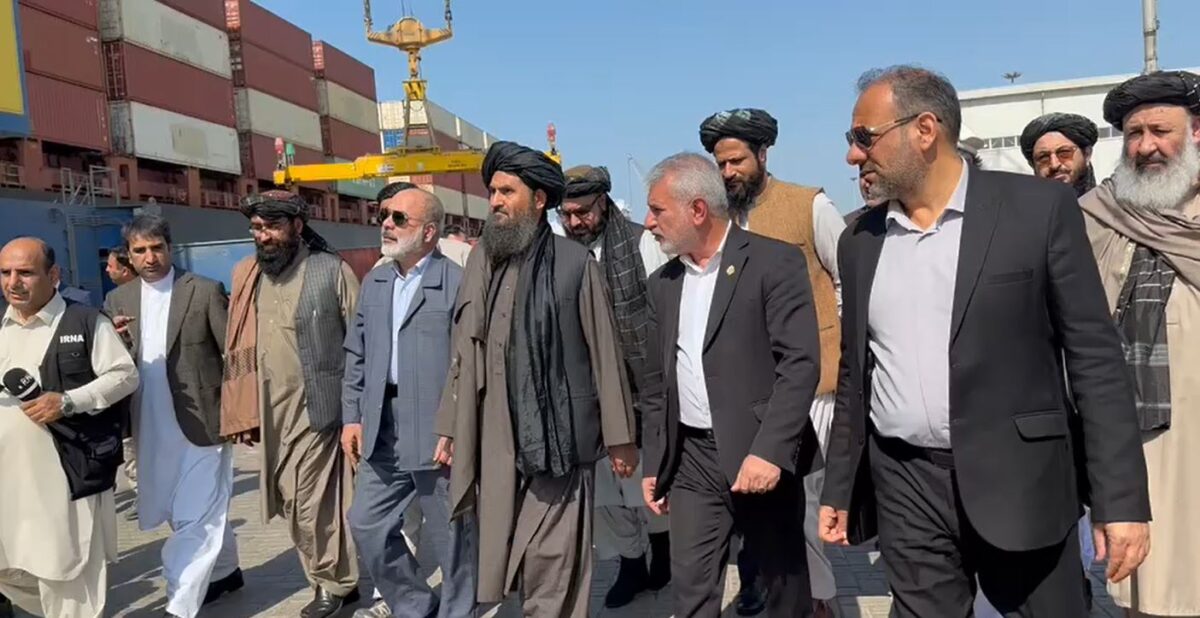In the last year, interactions between Taliban and Iranian officials have surpassed those with any other country during the Taliban administration.
From August 2021 until now, Taliban officials have made eight trips to Iran. Conversely, four Iranian delegations, including the deputy general staff of the Iranian armed forces, have made separate trips to Afghanistan, with a fifth trip scheduled in the near future.
According to Amu findings, conflicts occurred between the Taliban and Iranian border guards in four cases, resulting in the deaths of two Iranian border guards.
The dispute between the Taliban and Tehran over water rights has escalated, marking two years of fluctuating relations. But what strategic significance does Iran’s political embrace hold for the Taliban?
The warm relations between Tehran and the Taliban made headlines on February 27, 2023, when the Taliban took control of the Afghan embassy in Tehran. According to a source from the embassy, Iran justified its relations citing “security concerns” and efforts to “host to solve the problem of Afghanistan.”
The embassy handover wasn’t the first or the last step in their interaction. It appears the Taliban sought a broader partnership with Iran since the beginning of their return to power. The first foreign trip of Taliban’s acting foreign minister, Amir Khan Muttaqi, after the Taliban’s return to power, was to Tehran.
Including this trip, Taliban officials, some under UN travel bans, have made eight trips to Iran, including Muttaqi’s trip on January 9, 2022; the high-level delegation of the Ministry of Migration on December 12, 2022; Shamsuddin Shariati’s visit on February 23, 2023; the high-level delegation of the Ministry of Migration on March 14, 2023; the Acting Minister of Commerce’s trip on March 11, 2023; the Taliban delegation’s trip for the Islamic unity meeting on September 30, 2023; Abdul Ghani Baradar’s trip on November 4, 2023, and Abdul Latif Mansour’s trip on November 11, 2023.
The recent trip of Abdul Ghani Baradar, the economic deputy of the Taliban’s chief minister, at the head of a 30-member delegation, marked a significant development, emphasizing the warmth of the Taliban’s relations with Iran.
The Taliban government has not yet been recognized by any country, including Iran; but some media close to Iran’s government introduced Baradar as the “deputy prime minister of Afghanistan” during this trip.
During Baradar’s five-day trip, they signed five Memorandums of Understanding with the Iranians and had meetings with Vice President Mohammad Mokhbar, Foreign Minister Hossein Amir Abdollahian, Interior Minister Ahmad Vahidi, and Iran’s Ministers of Agriculture and Energy.
“These meetings were for the purpose of finding an easy and cheap way for Afghan goods to foreign countries,” Baradar said on his return to Kabul earlier this week.
From Iran’s side, in the past two years, four Iranian delegations, including Bahram Hossein Mutlaq, the deputy general staff of the Iranian Armed Forces, have come to Kabul on separate trips. Based on reports, an Iranian judicial delegation is also scheduled to visit Kabul, including the economic delegation on October 8, 2023; the delegation of the House of Representatives on August 28, 2023; the 11-member delegation on the issue of water rights on August 8, 2023; the military delegation on May 21, 2023, and the judicial delegation in the near future.
Despite four border clashes and the reported killing of two Iranian border guards by the Taliban in the last two years, Iran has maintained its interaction with the Taliban. Border conflicts occurred on December 1, 2021, March 7, 2022, March 11, 2022, and May 27, 2023, leading to the deaths of two Iranian border guards.
On the issue of water rights, relations between the Taliban and Tehran faced challenges. Although the differences extended beyond military clashes, even Iranian President Ebrahim Raisi issued a warning to the Taliban to uphold Iran’s water rights.
Raisi stated, “I am warning the rulers of Afghanistan to give the rights of the people of Sistan and Baluchistan as soon as possible.”
It appears the Taliban have factored in Iran’s water rights sensitivity into their political calculations more than Tehran. Despite the 1973 water treaty, the Taliban allowed the Iranian delegation to monitor water dams, ensuring the decrease in water rights is attributed to drought, easing Tehran’s concerns.
Based on the 1973 water treaty, in normal years, when the water volume is 3 billion cubic meters, Iran can have 820 million cubic meters of water per year. In drought years, this amount is proportional to the water condition.





